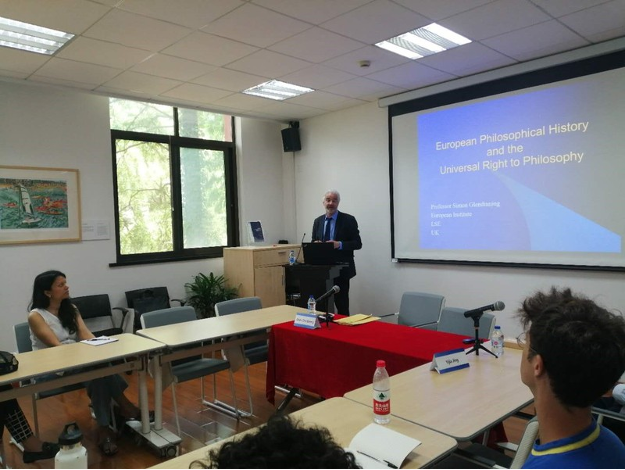
On May 28 2019, Professor Simon Glendinning delivered a lecture on European philosophical history at the Thinktank Building of Fudan University. The lecture was chaired by Prof Yijia Jing, Dean of IGPP. He briefly introduced Prof. Glendinning at the beginning. Simon Glendinning is Professor of European Philosophy and Head of the European Institute at the London School of Economics and Political Science. His early career was focused on the movement of Phenomenology in European Philosophy. However, since his appointment in the European Institute in 2004 his work has shifted from European Philosophy to Philosophy of Europe. He has written a number of essays and articles on this new theme, and is currently completing a two-volume book entitled Europe: A Philosophical History.

The lecture started with the discussions on tribal life in Africa. Prof. Glendinning argues that history began with philosophical rethinking of human past and future. Husserl affirms the idea that, for the Papuans of New Guinea, “primitive life…is life lived without history, without the trajectory of a temporality that extends indefinitely in both directions”. It is life lived, Husserl suggests, “always in the present; past and future have no teleological sense”.
Prof. Glendinning then moved to the discussion of the Universal Right to Philosophy. He said that “The teleological axis of Kantian discourse of world history has become the tradition of European modernity”. This Eurocentric discourse forces us to ask ourselves…whether today our reflection concerning the unlimited extension and the reaffirmation of a right to philosophy should not both take into account and delimit the assignation of philosophy to its Greco-European origin or memory. He argued that we encounter an obvious objection: philosophy, the science of the Greeks, is not something peculiar to them which came into the world for the first time with them. After all, they themselves tell of the wise Egyptians, Babylonians, etc., and did in fact learn much from them. Today we have a plethora of works about Indian philosophy, Chinese philosophy, etc., in which these are placed on a plane with Greek philosophy and are taken as merely different historical forms under one and the same idea of culture.
Prof. Glendinning said that we cannot and should not ignore that Husserl completely rejects this “obvious objection”, and wants to demonstrate that “it is a mistake…to speak of Indian and Chinese philosophy”. The argument is to distinguish two sorts of higher level functionaries, one concerned with the “practical” management of the “religious-mythic interests and their tradition in a unified way”, and the other, the philosopher, who “turns away from all practical interests…and strives for nothing but pure thēoria”.
In the following, Prof. Glendinning discussed the developmental beginning of a new human epoch and the Spiritual Europe. He referred to Europe not as it is understood geographically, but as if thereby the group of people who live together in this territory would define European humanity. He also argued what we have lived and what we are more and more aiming for are modes of appropriation and transformation of the philosophical in non-European languages and cultures. He concluded that an effective democratization is nothing short of the still unexhausted promise of the universal right to philosophy, including the right to Chinese philosophy.
The lecture was followed by heated discussions between Prof. Glendinning and the participants.




